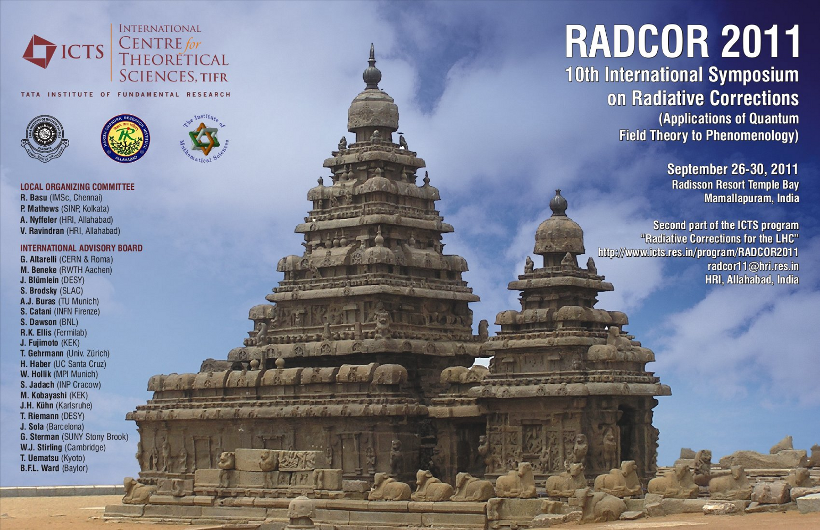
Radiative Corrections

This conference is the 17th in the series of biennial RADCOR conferences on radiative
corrections. It is devoted to the applications of quantum field theory to particle physics
phenomenology. Subjects will include precision calculations for colliders, progress in
higher-loop and higher-multiplicity calculations in the Standard Model, cross-sections for
new physics, interpretations of experimental data, new techniques for calculations,
advances in computer-algebra methods, new theoretical developments.

This conference is the 16th in the series of biennial RADCOR conferences on radiative corrections. It is devoted to the applications of quantum field theory to particle physics phenomenology. Subjects will include precision calculations for colliders; progress in higher-loop and higher-multiplicity calculations in the Standard Model; cross sections for new physics; interpretations of experimental data; new techniques for calculations; advances in computer-algebra methods; new theoretical developments.

The conference is devoted to the applications of quantum field theory to particle physics phenomenology. Subjects will include precision calculations for colliders; progress in higher-loop and higher-multiplicity calculations in the Standard Model; cross sections for new physics; interpretations of experimental data; new techniques for calculations; advances in computer-algebra methods; and new theoretical developments.

The main theme of the conference is the application of quantum field theory calculations to particle physics phenomenology focused on making high-precision predictions in the high-energy regime covering collider and flavor physics relevant for the LHC era and experiments in the future. Recent developments in theoretical studies of radiative corrections in the framework of the Standard Model and its extensions will be discussed as well as how these results impact the interpretation of available experimental data. Along with this, recent computer-algebraic, combinatorial and mathematical innovations to perform these calculations will be discussed.
The link to the conference website is
https://indico.desy.de/conferenceDisplay.py?ovw=True&confId=15733

This symposium combines the 12th International Symposium on Radiative Corrections (Radcor 2015) with LoopFest XIV (Radiative Corrections for the LHC and Future Colliders). This workshop provides a forum to coordinate activities focused on the theoretical challenges from current and future colliders.
We will focus on the potential for precision measurements, their role in searching for and disentangling physics beyond the Standard Model, progress in multi-loop and multi-leg calculations of Standard Model processes, new physics cross sections, new approaches and new theoretical developments. There will also be a few talks on more exotic theories and on the latest experimental progress.


Topics covered at RADCOR 2011 include: * Phenomenology at high-energy colliders * QCD physics of hard scattering * Electroweak radiative corrections, and applications to Standard Model and beyond the Standard Model processes * New theoretical methods and tools * Event generators and simulation of signal and background processes * g-2 of muon, heavy quarks (including B physics), and physics at B-factories and in e+e- collisions at lower energies


RADCOR 2007, the 8th International Symposium on Radiative Corrections "Application of Quantum Field Theory to Phenomenology", was held from the 1st to the 5th of October 2007, in Florence, Italy, at the Galileo Galilei Institute (GGI) for theoretical physics.
This is the eight symposium of this series. The main theme of these symposia is the application of quantum field theory to particle physics phenomenology in the high-energy regime. Recent developments in theoretical studies of the radiative corrections of the Standard Model and of its extensions are discussed and compared with available experimental data. Predictions for future experiments are presented.
The scientific program of RADCOR 2007 included the following topics:
- Phenomenology at high-energy colliders (HERA, Tevatron, RHIC, LHC, ILC);
- QCD physics of hard scattering;
- Electroweak radiative corrections, and applications to Standard Model and beyond Standard Model processes;
- New theoretical methods and tools;
- Event generators and simulation of signal and background processes;
- Heavy quarks (including B physics), and physics at B-factories and in e+e- collisions at lower energies;
and other related subjects.
RADCOR 2007 was be co-hosted by the Istituto Nazionale di Fisica Nucleare (INFN) and the Physics Department of the University of Florence.
